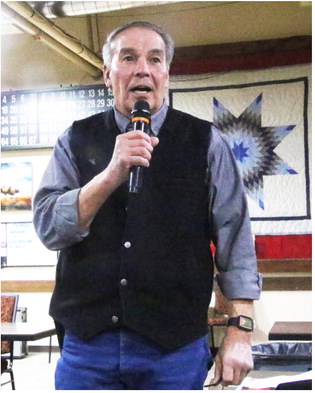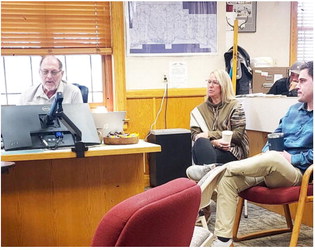Court Says Knudsen Can’t Rewrite Initiative
In two separate but related rulings, the Montana Supreme Court on Wednesday, Nov. 19, agreed with Montana Attorney General Austin Knudsen that a ballot measure that would have controlled judicial elections was unconstitutional, while allowing another to move forward, saying the wording his office proposed overstepped his authority.
Both measures involve the group Montanans for Nonpartisan Courts and challenged Knudsen’s decisions to reword the ballot statement on one, while declaring the other was constitutionally deficient. And both ballot initiatives are a part of a years’ long battle over the make-up and direction of Montana’s judiciary, including whether it should be partisan or nonpartisan.
Both challenges were brought simultaneously after Knudsen’s office approved Constitutional Initiative 132, but changed the description that would describe the initiatives to voters. Knudsen then said that Ballot Initiative 6 was insufficient due to a number of legal issues, including that it violated a clause of the state’s constitution.
Montanans for Nonpartisan Courts alleged that Knudsen had interfered unlawfully by rewriting CI-132 to bend them to his office’s political will. In Montana, ballot measures must pass through reviews by the Montana Secretary of State and the Attorney General’s Office for legal sufficiency.
Constitutional Initiative 132 Montanans for Nonpartisan Courts proposed a ballot measure that would amend Article VII of the state’s Constitution by adding “Section 12. Nonpartisan Judicial Elections. Judicial elections shall remain nonpartisan.”
Knudsen’s office changed the proposed ballot statement that is meant to briefly explain the purpose to voters in a succinct manner. Knudsen’s office argued MNC failed to inform voters what “is meant by ‘nonpartisan.’” Knudsen’s rewritten definition stated that “A nonpartisan election prohibits labeling candidates on the ballot according to the political party the candidate aligns with including labels like Independent.”
Montanans for Nonpartisan Courts, on the other hand, told the high court that Knudsen’s additional language would confuse voters and was unnecessary. Attorneys for the group claimed that voters didn’t need “nonpartisan” defined.
Most of the Supreme Court agreed that Knudsen’s office overstepped Montana law in the case, and rejected his changes.
“We will not invalidate a ballot statement simply because a better one could be written,” said the opinion written for the majority by Shea. “We disagree with the Attorney General that the statement requires a ‘working definition’ of ‘nonpartisan’ where the statutes pertaining to nonpartisan elections have never found it necessary to define the term and where Montana voters have ample experience with nonpartisan elections — the last 90 years of nonpartisan judicial elections being but one example.”
The justices were concerned that Knudsen’s that was injecting politics into a “straightforward proposition.”
“The Attorney General’s assertion that nonpartisan elections are ‘the policy position of the political branches’ uses many words to obscure a straightforward proposition. The term of art for ‘the policy position of political branches’ is ‘law.’ ‘Law’ is also a term of art that describes the provisions of constitutions,’” the opinion said. “Thus, the Attorney General’s statement that ‘petitioner is remiss to equate a legislative policy with a constitutional principle,’ might also be expressed as ‘Petitioner is remiss to equate law with law.’” Chief Justice Cory Swanson concurred with the the majority in part and dissented in part, while Justice Jim Rice said he would have permitted the ballot description by Knudsen’s office.
Ballot Issue 6
In the other case, Ballot Issue 6 proposed two parts, amending Article VII of the Constitution to state that judicial elections would remain nonpartisan; and that any new court created after the amendment would consist of judges elected on a nonpartisan basis.
Knudsen declared the proposed measure did not pass legal scrutiny, based on a rule that ballot initiatives must involve a “single subject.”
That constitutional rule requires a proposal to only address or alter one subject. This prevents confusing the voters, or “logrolling” — the political practice of putting more than one item before the voters often so that a politically unpopular item can be carried because its paired with something more politically popular or palatable.
A unanimous Supreme Court said that while the two parts of Ballot Initiative 6 would seem to be about same subject — that judges in the state would remain nonpartisan — the justices said that how all judges are selected is different than whether they are partisan. It agreed with Knudsen, concluding that Ballot Issue 6 was “legally insufficient” and couldn’t be presented to voters.
The court said voters would really be making a choice on two distinct, if related, issues: “One to give voters the choice to require all judicial elections to be nonpartisan and one to give voters the choice to require that judges on any court created in the future must be elected.”
The court also said that while the proposal for future courts seems straightforward, in practice, it could lead to unresolved issues.
“BI-6 could have the effect of prohibiting the governor from appointing judges to fill vacancies on an interim basis until an election can be held. Or, it could affect the appointment of judges to oversee specialty courts,” the court said in its decision. “The question, however, is not how BI-6, if passed, should be interpreted, but whether the voters could readily understand the effect of (it).”
It also pointed out that not every “judicial office” in Montana is elected.
“Other statutorily created courts of limited jurisdiction, including the water court, workers’ compensation court, city courts and small claims courts have appointed judges,” the ruling said. “It is conceivable that voters may have differing opinions as to whether judicial elections should be nonpartisan and whether it should be required that courts created in the future have elected judges.”
Montanans for Nonpartisan Courts were represented by Raph Graybill and Rachel Parker of the Graybill Law Firm in Great Falls, and Alex Rate of the American Civil Liberties Union of Montana.
A nearly identical case appealed to the high court by another group proposing a nonpartisan judicial ballot initiative, CI-131, has yet to be ruled on. The attorney general similarly rewrote the ballot language on that initiative, brought by Montanans for Fair and Impartial Judges. MNC joined MFIJ in their appeal.



